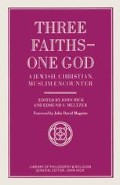Abstract
Judah Halevi is known as the most Jewish of Jewish philosophers. He is characterised that way because he rejected the attempts of the philosophers of his time to arrive at an understanding of God through reason. Writing in the twelfth century, he created an imaginary dialogue between a rabbi and the king of the Khazars, whose historical counterpart had converted himself and all of his realm to Judaism in the eighth century. In convincing the king of the truth of Judaism, Halevi’s rabbi argues that rational speculation is subject to mistakes and often leads to doctrinal errors. Even at its best reason may inform us of an abstract, philosophic God but not the living, commanding Lord with whom the religious Jew interacts. Only revelation and God’s actions in the history of Israel can provide an accurate (even if partial) description of Him, an explanation of the real grounds of the believer’s belief, and an understanding of why believers are prepared to sacrifice so much for their beliefs, in sharp contrast to the theology, justifications, and resultant behaviour of the philosophers. Anticipating Pascal by five hundred years, Halevi carefully and consistently distinguishes between the God of Abraham and the God of the philosophers (which, for him, meant primarily the Aristotelians) in their differing depictions of God, the reasons for believing in Him, and the conduct that grows out of that belief.
Access this chapter
Tax calculation will be finalised at checkout
Purchases are for personal use only
Preview
Unable to display preview. Download preview PDF.
Notes and References
Judah Halevi, The Kuzari, Isaak Heinemann (trans.), in Three Jewish Philosophers (Philadelphia: Jewish Publication Society, 1960) Book I, pars 11–15, pp. 33–4, and Book IV, pars 3, 13, 15–17, pp. 113–14, 116–19.
Robert Gordis, A Faith for Moderns (New York: Bloch Publishing Co., 1960) ch. 1; cf. also ch. 13.
James William McClendon, Jr, Biography as Theology (Nashville and New York: Abingdon Press, 1974).
Pesikta d’Rav Kahana, ch. 15. Although the manuscripts have se’or (leaven), Professor Robert Gordis has pointed out that that is probably an error. ‘Leaven’ is not applicable to Torah, since its metaphoric use refers to sinfulness. The reading should probably be ma’or (light).
Even the Kantian category of ‘practical reason’ is the exercise of our rational powers in analysing our practice, not knowledge that arises from our action.
Tosefta Sanhedrin 7:3; cf. Babylonian Talmud, Sanhedrin 36b and Maimonides, Mishneh Torah, Laws of Courts (Sanhedrin) 2:3.
For a thorough discussion of the Rabbinic and major contemporary positions on the nature and authority of revelation, cf. my Conservative Judaism: Our Ancestors to Our Descendants (New York: United Synagogue Youth, 1977) ch. III, sects C and D.
Abraham Joshua Heschel, Man Is Not Alone: A Philosophy of Religion (New York: Farrar, Straus, and Young, 1951) chs 14 and 15. Cf. also Heschel, The Prophets (Philadelphia: Jewish Publication Society, 1962) chs 12, 14 and 15.
From the Yigdal prayer, which is based on Maimonides’ ‘Thirteen Principles of the Faith’. Cf. Philip Birnbaum (trans.), Daily Prayer Book (New York: Hebrew Publishing Company, 1949) pp. 11, 153 (the third of Maimonides’ principles).
Sanhedrin 11a; Bava Metzia 59b; Bava Batra 12a.
Cf., for example, Lev. 19:2 and the Sifra on that verse; Sotah 14; Sifre, Ekev, 85a; Mekhilta Shirah 3, etc.
Martin Buber has stressed this point, especially in I and Thou (New York: Charles Scribner’s Sons, 1958).
Cf. also Will Herberg, Judaism for Modern Man (Cleveland and New York: World Publishing Company, 1951) ch. 7.
Buber, I and Thou, especially pp. 81–3; Martin Buber, Eclipse of God (New York: Harper, 1952, 1957) pp. 42–6.
Cf., for example, Ian Ramsey, Religious Language (London: Student Christian Movement Press, 1957);
Frederick Ferre, Language, Logic, and God (New York: Harper and Row, 1961);
James A. Martin, The New Dialogue between Philosophy and Theology (New York: The Seabury Press, 1966).
So Rabbi Reuben in the second century said: ‘Nobody proceeds to commit a transgression without first having denied Him who prohibited it’, Tosefta, Shevuot, 3:6.
One of the first was by Rita Gross, ‘Female God Language in a Jewish Context’, in C. Christ and J. Plaskow (eds), Womanspirit Rising (New York: Harper and Row, 1979) pp. 167–73.
Elliot N. Dorff, ‘The Covenant: How Jews Understand Themselves and Others’, Anglican Theological Review, 64 (4) (October 1982) pp. 481–501.
Editor information
Editors and Affiliations
Copyright information
© 1989 The Claremont Graduate School
About this chapter
Cite this chapter
Dorff, E.N. (1989). ‘This is my God’: One Jew’s Faith. In: Hick, J., Meltzer, E.S. (eds) Three Faiths — One God. Library of Philosophy and Religion. Palgrave Macmillan, London. https://doi.org/10.1007/978-1-349-09434-9_2
Download citation
DOI: https://doi.org/10.1007/978-1-349-09434-9_2
Publisher Name: Palgrave Macmillan, London
Print ISBN: 978-1-349-09436-3
Online ISBN: 978-1-349-09434-9
eBook Packages: Palgrave Religion & Philosophy CollectionPhilosophy and Religion (R0)

